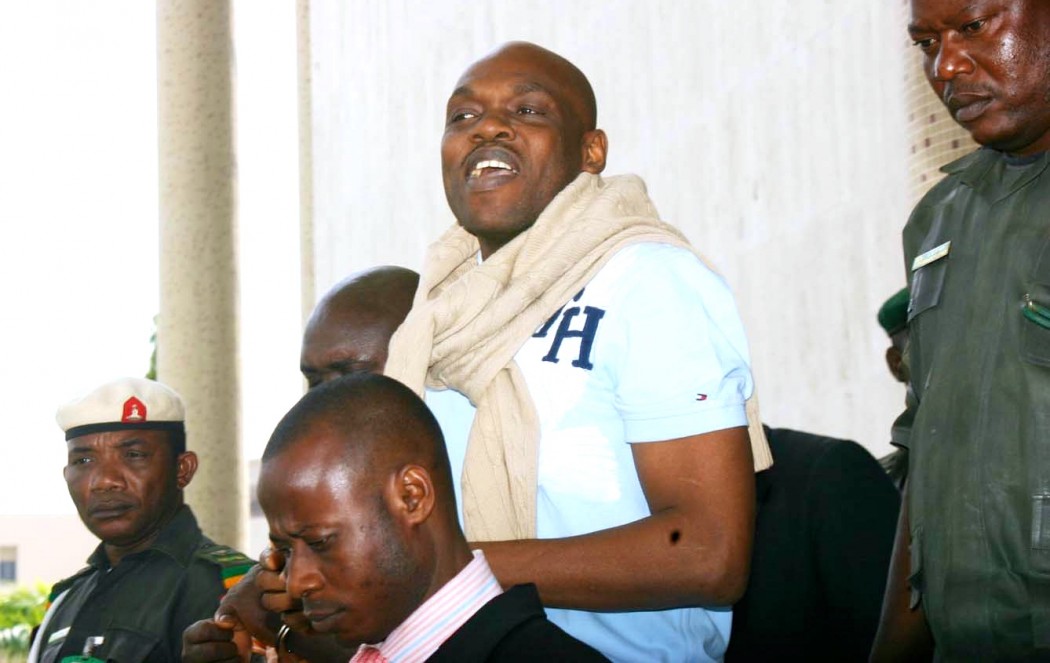Charles Okah, the mastermind of the 2010 Independence Day bomb blast that left twelve persons dead at the Eagle Square in Abuja, has been sentenced by the Abuja Division of the Federal High Court, on Wednesday, March 7, 2018, to life imprisonment.
The court, in a judgment that lasted over fives hours, equally found Okah’s alleged accomplice, Obi Nwabueze, guilty and also handed him a life sentence.
Trial Justice Gabriel Kolawole held that oral and documentary evidence the Federal Government tendered before the court, connected the defendants to the October 1, 2010, bomb blast.
He held that the prosecution proved the terrorism charge against the defendants beyond every reasonable doubt.
The court said there was evidence that convicted Henry Okah, a former leader of the Movement for the Emancipation of the Niger Delta, MEND, released funds the defendants used to purchase cars that were used to detonate bombs in Delta State on March 15, 2018, and in Abuja on October 1, 2010.
While the court noted that two out of six cars that Henry ordered to be purchased, a Mazda 626 and a Honda Hala, were wired with dynamites and deployed to the Eagle Square in Abuja, it stressed that evidence revealed that one of the cars was used for the bomb explosion that rocked a post-amnesty programme that was organised by Vanguard Newspaper in Warri, Delta State.
It found Charles who is a younger brother to the ex-MEND leader and Nwabueze, guilty on five out of the eight count charges FG entered against them. Justice Kolawole maintained that the defendants failed to convince the court through credible evidence, that they were not involved in the acts of terrorism they were charged with.
He said the defendants could not validly explain what the sums of N1.2 million and N2 million that Henry released to them in 2010, was used for.
It will be recalled that one of the alleged planners of the bomb attack that marred Nigeria’s fiftieth anniversary, Mr. Osvwo Tekemfa Francis, a.k.a ‘General-Gbokos’, died in prison custody, while the court, in a separate trial, jailed the 3rd accused person, Edmund Ebiware, to life imprisonment in 2013.
All the defendants were initially arraigned before the High Court on December 7, 2010, and subsequently re-arraigned on January 12, 2011, on charges predicated on section 15 (1) and (2) of the Economic and Financial Crimes Commission, Act, attracts life imprisonment upon conviction.
The Federal Government had in an 8-count terrorism charge marked FHC/ CR/186/2010, insisted that it was Charles that mobilised the other defendants.
Whereas the Okah brothers were alleged to have coordinated as well as procured all the materials that were used for the attack, FG, told the court that it was the 2nd defendant, Nwabueze, that helped them to fix Improvised Explosive Devices, IEDs, in two cars it said were used for the bombing.
In his judgment, Justice Kolawole held that evidence before the court showed that the 2nd defendant, Nwabueze, made himself available as a foot-soldier to be used for evil errands that earned him monetary rewards.
The court observed that Nwabueze had in his confessional statement that was entered into evidence as Exhibit 2D1 to D9, admitted that he was contracted to construct special compartments in the cars where the IEDs were fixed.
Meanwhile, before the sentence was passed, the defence lawyers, Emeka Okafor and Oghenovo Otemu, pleaded the court to temper justice with mercy.
They urged the court to consider that their clients had no previous criminal records, adding that they have been in prison custody for over eight years.
Okah told the court that he has an aged mother and kids that depended on him for survival. Relying on section 311 and 401 of the Administration of Criminal Justice Act, Okah, prayed the court to mitigate his sentence, vowing not to engage in any form of criminality again.
However, Alex Iziyon, SAN, a government lawyer, asked the court to impose the full sanction that was provided by the law, insisting that conduct of the defendants during the trial was enough to deny them any form of favourable discretion from the court.
He insisted that family of the victims deserved justice, adding that imposing the full sentence would serve as deterrant to other militants. After he had listened to all the parties, Justice Kolawole said he had to place the section under which the defendants were charged, above every other consideration.







